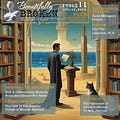CONTENTS
BROKEN WORLD
The Value-Add Of Artists Suffering For Rich Patrons
PRACTICAL ENLIGHTENMENT
Surviving Consumption Mindset To Find Peace In The Modern World (with Heironomous Bosch)
FOOTPRINTS IN THE SAND
Spike Milligan's Poem: New Members Welcome
FICTION
Into The Labyrinth Part 6: Willow Tree Song, I'm There! (with Brian Eno)
REPORTAGE HAIKU
Dream with the Cats of the Ancient Village of Mouans-Sartoux
EDITORIAL (& FASTING)
Welcome to Beautifully Broken Issue 11 and happy Eid Mubarak to our Muslim brothers and sisters (عيد مبارك) who completed their period of Ramadan fasting this week. Christianity had a strong tradition of fasting but now it’s quite weak and doesn't involve much sacrifice:
On Ash Wednesday and Good Friday, fasting rules allow Catholics to eat only one full meal and two smaller meals which, combined, would not equal a single normal meal. Additionally, Catholics may not eat meat on these two days–or on any Friday during Lent.
Orthodox Christians are required to fast on Wednesdays (in memory of Jesus' betrayal on Spy Wednesday) and Fridays (in memory of Jesus' crucifixion on Good Friday), which means not consuming olive oil, meat, fish, milk and dairy products until evening (sundown).
I believe the Ethiopian Coptic Christians are more serious with their fasting.
Out of the 365 days of the year, Copts often fast between 210 and 240 days. This means that Copts abstain from all animal products for up to two-thirds of each year. Coptic Orthodox fasts have evolved over time to become more lengthy and severe.
I suppose competitive fasting is in the category of “too much is as bad as too little”. At the very least, moderate fasting clears toxins from the body, reduces excess body fat and helps sharpen the mind. A clear mind and body also aid spiritual clarity.
Fasting for spiritual practice is an ancient tradition but more and more I hear about the health benefits of intermittent fasting in the media. Benefits include:
Weight loss. ...
A lower risk of type 2 diabetes. ...
Improved heart health. ...
Improved brain health. ...
A reduced risk of cancer. ...
Changes to the function of cells, genes, and hormones. ...
Reduced oxidative stress and inflammation. ...
Induces cellular repair processes.
Okay, onto this week’s issue.
For our Broken World segment we explore the right way and the wrong way to help those less fortunate than ourselves (and artists which is often the same thing).
In Practical Enlightenment we examine the damage that our modern consumption mindset inflicts upon humanity and the environment and seek some practical solutions to liberate ourselves from misaligned desire.
The latest instalment in the fictional modern haibun Into The Labyrinth, our protagonist meditates under a willow tree to try and make sense of everything that's happened to him since he set forth on his journey.
For Footprints In The Sand (which features inspirational art or writing by a deceased artist or writer) I've chosen a poem by Irish-British comedian Spike Milligan and this week's Reportage Haiku takes us to the French village of Mouans-Sartoux to see its cats and experience the dreams they bestow.
I post the sections separately to the Beautifully Broken substack as soon as they’re done (mostly Friday, Saturday) and before I compile each article to form the weekly edition for email subscribers so feel free to check in at morganbuchanan.substack.com if you want early access (subscriber only articles will still only be available to subscribers).
Have a great weekend,
Morgan
ps: Make sure to scroll all the way to the end to see the beautiful spring flowers that are part of the Easter display at the Grasse Cathedral in the south of France.
Keep reading with a 7-day free trial
Subscribe to Beautifully Broken to keep reading this post and get 7 days of free access to the full post archives.



